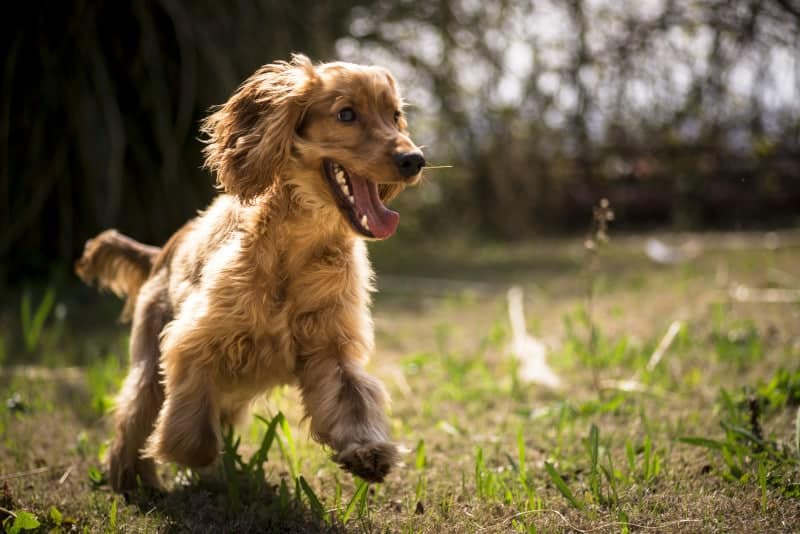Science has validated the fact that baby toys can effectively stimulate a child’s brain along critical parts of their developmental pathway. The brains of puppies can be stimulated and their level of intelligence enhanced with new designer dog toys, created specifically to challenge and stimulate their mind. Dr. Carol offers playtime tips and exercise ideas geared to meet your puppy’s specific needs and boost his brain at each of the 4 critical stages of development from day one through 18 months of age.
Dr. Carol’s Tip: Regardless of which developmental stage your pup is in, safety and supervision are a must!
Stage 1: Basic Survival Skills
Weeks 0-2: Pups learn about taste and touch
Soft, snugly plush scented toys are ideal.
Weeks 2 to 4: Puppy’s baby teeth begin to erupt, they learn to walk, and their eyes open and vision improves. Provide toys that aid teething discomfort. Toys should be approximately twice the length of the distance from the top of their head to their chin so that they are small enough to fit into their mouth but large enough to prevent choking. Many natural homemade toys are great. Twist and freeze a few wash cloths soaked in fruit juice. Cut up fresh carrots and green beans, freeze them and offer a few daily. Freeze fruit juice or sugar free cool-aid in an ice tray and give a few cubes outside. This is great low cost, fun family projects that your children and your pup can enjoy together. The natural frozen teething treats are healthy and effectively help relieve teething discomfort. They’re also sock and shoe savers as they positively reinforcement and thereby help teach your puppy what’s ok to chew on and what’s not.
Stage 2: Socialization Skills
Weeks 3-12: Since your puppy is now becoming more aware of his surroundings, expose him to as many new sights, sounds and smells as possible. Take him with you to visit novel places and let him get familiar with other people and pets.
Months 3-6: Find a playmate for your pup or join a local puppy group in your neighborhood. Observe his habits as he interacts with other puppies. This will help you understand your pup’s natural behavioral inclinations as far as whether he is instinctively dominant or submissive. Teething is major at this stage and pups chew a lot so be sure his toys are both safe and size appropriate. Toys to pacify your pet at this stage include noisy balls that bounce as well as interactive toys such as hard rubber toys with embedded treats. For small breeds, tennis balls, Frisbee’s and plush toys without stuffing help satisfy pups during this “oral fixation stage.”
Be creative! Home- made games can be fun and educational for the whole family. Buy a few different colors of water based, lead free paints. Grab some fabric: it might be a table cloth, napkins, a bedspread or even a shower curtain. Pour each color onto a separate cookie sheet. Gently place your pup onto each cookie sheet. Let him walk a few steps through the paint, then pick him up and place him on the fabric. You’ll end up with a cute custom collection of usable items personalized with your puppy’s paw prints.
Stage 3: Exploratory Period
Months 7-9: Your puppy has hit “toddler time” and is full of spit and vinegar. He will naturally begin to test his boundaries and challenge his environment. More advanced toys are appropriate now and since his adult teeth are beginning to erupt, keep your chew toys readily available. Chewing is a normal part of your puppy’s natural development. Their brains crave it. Frozen teething toys are all the rage for pups during this stage. They help prevent furniture chewing and as they chew the toys, the water melts in their mouth which soothes their inflamed gums. Schedule routine play-times and stick to them.
Stage 4: Adolescents
Months 16-18: Research indicates that this is prime time for pups to learn, understand and manipulate their environment. Age appropriate toys at this stage will stimulate your puppy’s brain and enhance his level of intelligence. Consider landscaping a dog friendly yard. Dr. Carol will also offer you suggestions for creating a fun garden filled with safe, healthy plants, herbs and obstacles your pup can sniff, chew, play with and navigate through.
ps-To learn more about puppy potty training, click here. For a great read on puppy do’s and don’ts, click here.
